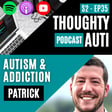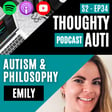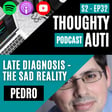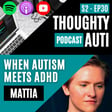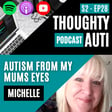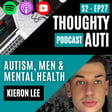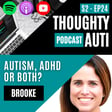
Temple Grandin - 20th Vs 21st Century Autism Advocacy
How far has Autism come in 50 years? Is the shift in focus GOOD or BAD for Autistic adults?
Professor Temple Grandin is a renowned author, speaker and Autism advocate who has and still is changing the cattle industry
In this episode of the Thoughty Auti Podcast, Thomas Henley talks to Temple about his experience of Autism advocacy in the modern day, comparing it against Temples own experiences in the past
Kicking off the chat, they talk all about recent events in the media - touching briefly on Temples book 'Thinking In Pictures', her movie, and the more recent publications like 'Different NOT Less'. Getting down into the meat of the episode, they chat about how the focus of Temples childhood was on manners, following work and developing hobbies... vastly different from the modern day focus on language, stimming, self-advocacy and identity.
The professor explains she has substituted 'Emotional Complexity' with 'Intellectual Complexity' and the two theory over the impact of work and relationships in overall Quality Of Life.
In the modern day, advocacy is done through social media platforms, and Temple highlights that this change has been difficult and potentially damaging for the autistic community (Thin Slice Judgements come to mind). Ending the episode, they chat about positives and negatives to modern day advocacy, reminiscing on the shared difficulties on navigating the language and social landscapes.
If you have an exciting or interesting story and want to appear on the next podcast, please contact me at: aspergersgrowth@gmail.com
Temple's Links:-
Books - https://www.templegrandin.com/books.html
Twitter - @DrTempleGrandin
Song Of The Day (Listen Here) - https://open.spotify.com/playlist/5UDIyN5TSYN4zMcRoQPrG8?si=9255ed3480d840b5
▬▬▬▬▬▬▬▬▬▬▬▬▬▬▬▬▬▬▬▬▬▬▬▬▬▬▬▬▬▬▬
Website - https://www.thomashenley.co.uk
♫ THOUGHTY AUTI PODCAST Get it on Spotify free here - https://open.spotify.com/show/6vjXgCB7Q3FwtQ2YqPjnEV
FOLLOW ME On Social Media ♥ -
☼ Facebook - Aspergers Growth
☼ Twitter - @aspergersgrowth
☼ Instagram - @aspergersgrowth
Support via Patreon! - https://www.patreon.com/aspergersgrowth








